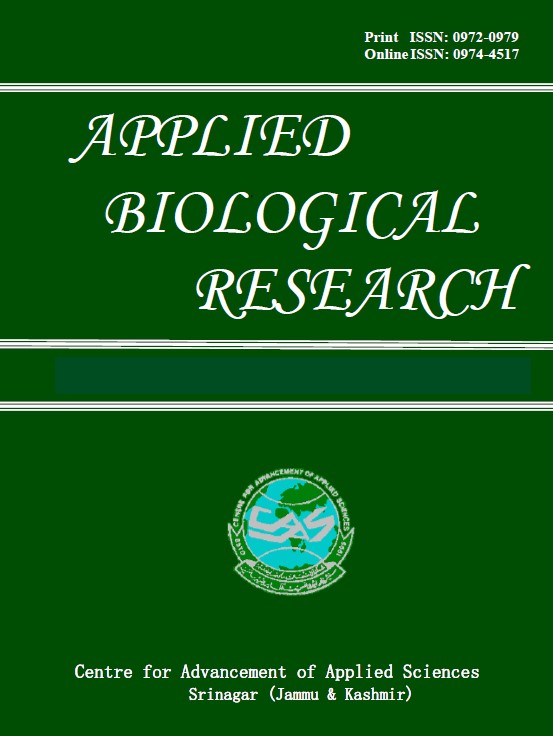Strain Improvement Of Specialty Mushroom, Calocybe Indica, Through Mutagenesis
DOI:
https://doi.org/10.48165/Keywords:
Calocybe indica, enzyme activity, mushroom, mutagenesis, putative mutants, yieldAbstract
Calocybe indica, a specialty mushroom, is the third most popular mushroom in India. During present investigation 9 strains of C. indica were cultivated on wheat straw using the recommended technology. Maximum biological efficiency was obtained in strain Ci-3 (81.28%). The improvement in Ci-3, a high yielding strain, was attempted using mutagenic treatment on protoplasts. Four mutagenic treatments (one irradiation and three chemical) yielded 30 putative mutants. Growth studies of putative mutants indicated maximum growth rate of CMB-4 on wheat straw while CMN-11 gave maximum biomass on complete yeast extract medium. Mutant CMN-9 gave maximum endoglucanase (0.345 µg min-1 ml-1) and xylanase (0.54 µg min-1 ml-1) activity. Seven mutants were identified on the basis of growth and enzymes studies. Cultivation of mutants was carried out on wheat straw following hot water treatment. Four mutants (CMN-3, CMN-9, CMN-11 and CMB-4) gave significantly higher yield than the parent.
Downloads
References
Bucht, B. and Erikson, K.E. 1968. Extracellular enzyme system utilized by the rot fungus Stereum sanguinolentum for the breakdown of cellulose. Archives of Biochemistry and Biophysics, 124: 134-141.
Djajanegara, I. and Harsoyo, H. 2008. Mutation study on white oyster mushroom (Pleurotus florida) using gamma (60 Co) irradiation. Journal of Chemical and Natural Resources Engineering, 4: 12-21.
Homolka, L., Vyskočil, P. and Pilát, P. 1988. Mutagenization of protoplasts of Oudemansiella mucida. Applied Microbiology and Biotechnology, 28: 166-169.
Kaur, G. 2010. Molecular Characterization and Isozymic Variation in Calocybe indica (P & C) strains. M.Sc. thesis submitted to Punjab Agricultural University, Ludhiana, Punjab, India. Kaur, P. 2003. Nutritional and Cultivational Aspects of Calocybe indica. M.Sc. thesis submitted to Punjab Agricultural University, Ludhiana, Punjab, India.
Krishnamoorthy, A.S., Marimuthu, T and Muthusamy, M. 2002. Enzymes related biodegradative potential of Calocybe indica. pp. 36 In: Souvenir and Abstracts 3rd Indian Mushroom Conference. Tamil Nadu Agricultural University, Coimbatore, Tamil Nadu, India.
Strain improvement of Calocybe indica through mutagenesis 69
Lee, Y.K., Chang, H.H., Kim, J.S., Kim, J.K. and Lee, K.S. 2000. Lignocellulolytic mutants of Pleurotus ostreatus induced by gamma-ray radiation and their genetic similarities. Radiation Physics and Chemistry, 57: 145-150.
Mangat, M. 2005. Evaluation of Calocybe indica Strains for their Enzymes and Yield Potential. M.Sc. thesis submitted to Punjab Agricultural University, Ludhiana, Punjab, India.
Miller, G.L. 1959. Use of dinitrosalicylic acid reagent for determination of reducing sugars. Analytical Chemistry, 31: 426-428.
Mukherjee, M. and Sengupta, S. 1986. Mutagenesis of protoplasts and regeneration of mycelium in the mushroom Volvariella volvacea. Applied and Environmental Microbiology, 52: 1412-1414. Pani, B.K. 2010. Optimal in vitro environmental conditions for the growth of white summer mushroom (Calocybe indica). Research Journal of Agricultural Sciences, 1: 280-281
Raper, C.A., Miller, R.E. and Raper, J.R. 1972. Genetic analysis of the life cycle of Agaricus bisporus. Mycologia, 64: 1088-1117.
Redhu, N. 2010. Studies of Extracellular Lignocellulolytic Enzyme in relation to Calocybe indica (P&C) strains. M.Sc. thesis submitted to Punjab Agricultural University, Ludhiana, Punjab, India.
Toyomasu, T. and Mori, K.I. 1987. Intra- and inter-specific protoplast fusion between some Pleurotus species. Agricultural Biology and Chemistry, 51: 935-937.
Toyomasu, T., Matsumoto, T. and Mori, K.I. 1986. Interspecific protoplast fusion between Pleurotus ostreatus and Pleurotus salmoneo-stramineus. Agricultural and Biological Chemistry, 50: 223- 225.

